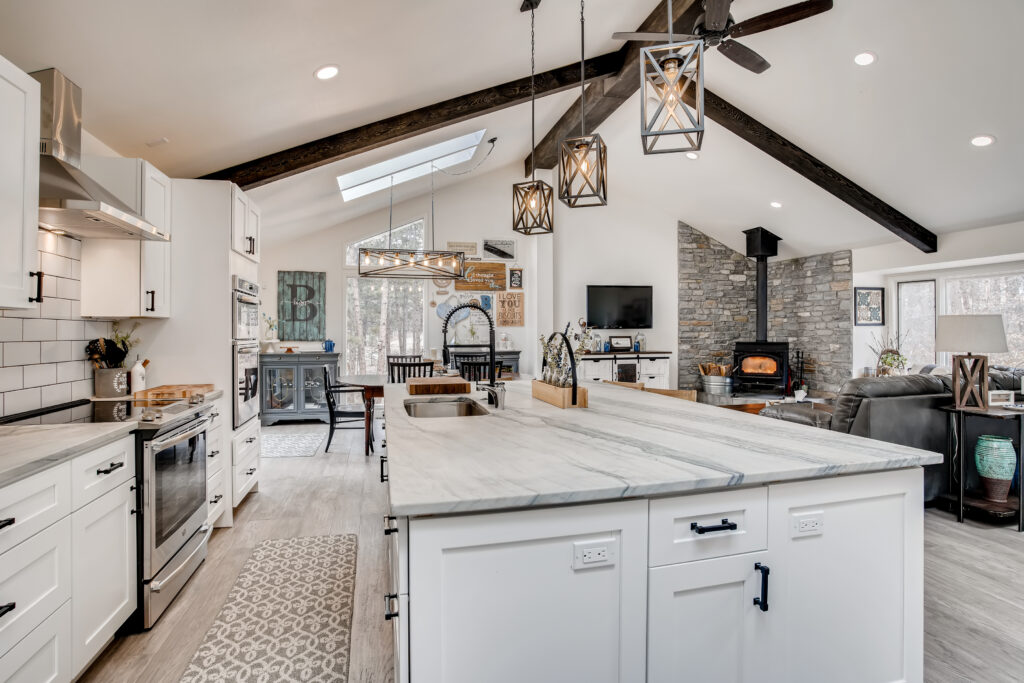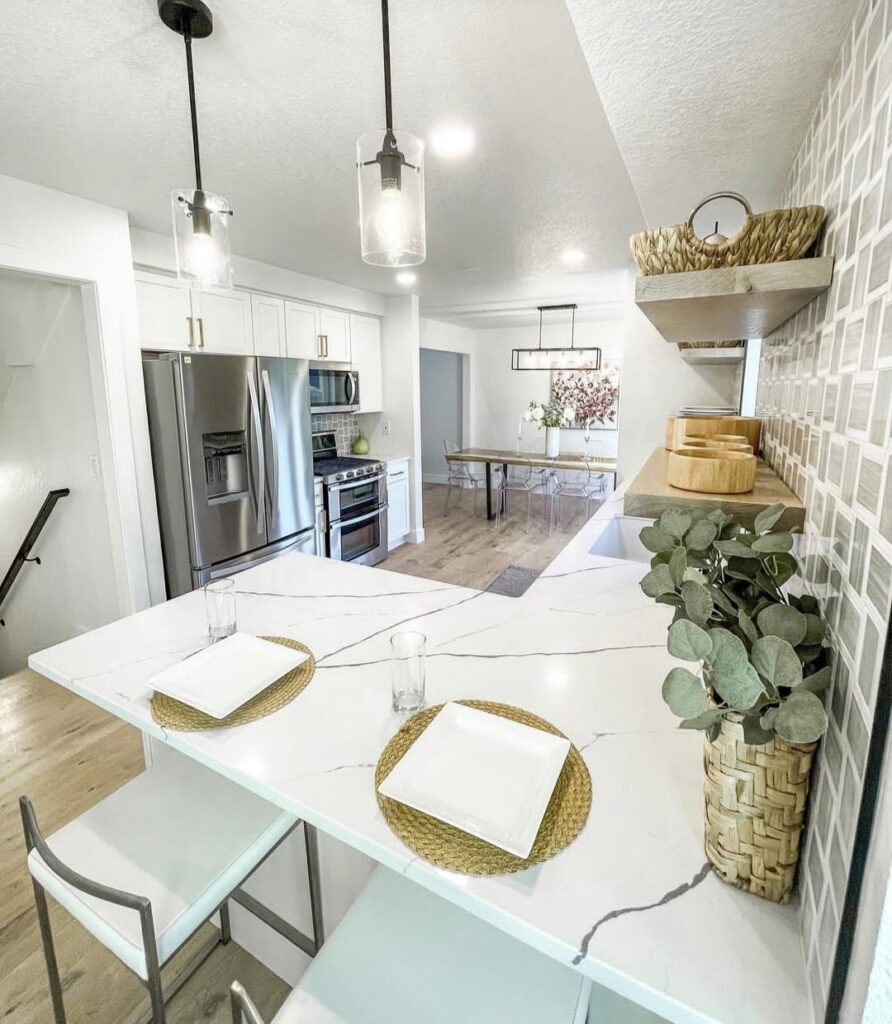Granite vs Quartz
The Battle of Granite vs Quartz: An In-Depth Comparison


Pictured above are CO Stone Yard supplied, fabricated and Installed projects.
When it comes to kitchen countertops, two materials that often spark heated debates are granite and quartz. Homeowners have strong opinions about their preferred choice, as seen on popular shows like House Hunters. But beyond personal aesthetics, is there a clear winner when it comes to functionality and durability? In this comprehensive article, we will delve into the key differences between granite and quartz countertops, examining factors such as appearance, price, maintenance, durability, and environmental impact. By the end, you’ll have the knowledge to make an informed decision on which material is best suited for your needs.
Understanding Granite and Quartz
Before we dive into the details, let’s start with a brief overview of what granite and quartz countertops actually are.
Granite: Nature’s Masterpiece
Granite is a 100% natural stone that is quarried from various locations around the world. It is formed through the slow cooling and solidification of molten materials deep within the Earth’s crust. This unique geological process gives granite its characteristic beauty, with an array of colors and patterns ranging from subtle earth tones to vibrant and gem-like shades. Each slab of granite is truly one-of-a-kind, as no two pieces are identical.
Quartz: The Engineered Stone
Quartz countertops, on the other hand, are engineered using a combination of crushed quartz crystals, resin, and synthetic additives. The process involves pulverizing natural quartz and mixing it with resin to create a highly durable and versatile material. Quartz countertops offer a wide range of colors and patterns, with the ability to mimic the look of natural stone like marble.
1. Appearance: Natural Beauty vs Customizable Design
When it comes to appearance, both granite and quartz have their unique qualities that appeal to different homeowners.
Granite: Nature’s Artwork
Granite countertops showcase the beauty of natural stone with its intricate patterns and variations. The geological formation of granite creates stunning visual effects, with swirls, speckles, and veins adding depth and character to each slab. Whether you prefer a subtle complement to your kitchen or a standout slab with bold mineral inclusions, there is an almost limitless selection of granite options to choose from.
Quartz: Versatile Customization
One of the main reasons quartz has gained popularity is its ability to offer a wide range of customizable designs. Unlike natural granite, quartz countertops are engineered to have a consistent appearance throughout the slab. This makes it easier to find a quartz countertop that matches your desired color scheme or pattern. Whether you’re looking for a classic marble-look or a solid color that complements your kitchen design, quartz provides a versatile range of options.
2. Price: Finding the Right Balance
Price is an important consideration when choosing between granite and quartz countertops. Let’s explore the cost factors associated with both materials.
Granite: A Range of Affordability
The cost of granite countertops can vary depending on factors such as color, texture, pattern, availability, and scarcity. On average, granite countertops can range from $60 to $175 per square foot, including fabrication and installation. It’s worth noting that some stone suppliers may offer remnants or discounted slabs, which can be a cost-effective option for smaller areas like bathroom vanities or fireplace surrounds.
Quartz: A Higher Price Range
Quartz countertops generally have a higher price range compared to granite. The average cost for quartz countertops, including installation, falls between $65 and $140 per square foot. Factors such as the manufacturer, color, and texture can impact the final price. Many homeowners find the durability and customizable design of quartz to be worth the investment.
3. Maintenance: A Comparison of Care
Maintenance requirements play a crucial role in the longevity and appearance of your countertops. Let’s explore the maintenance differences between granite and quartz.
Granite: Natural Beauty with Care
Granite is a porous material, which means it can absorb liquids and be prone to staining if not properly sealed. To maintain the beauty of granite countertops, it is recommended to seal them every 12 months or as needed. Regular cleaning with soap and water or a mild household cleaner is also important to prevent staining and keep the surface looking pristine. While granite countertops require more attention and care, the natural beauty they offer is often worth the maintenance.
Quartz: Easy Care and Maintenance
One of the advantages of quartz countertops is their non-porous nature, making them resistant to stains and bacteria growth. Unlike granite, quartz does not require sealing since it is already engineered to be non-absorbent. Regular cleaning with soap and water or a recommended quartz cleaner is sufficient to keep quartz countertops looking their best. The low maintenance requirements of quartz make it a popular choice for homeowners seeking convenience without compromising on style.
4. Durability: Withstanding the Test of Time
Durability is a crucial factor to consider when selecting countertops that can withstand the daily wear and tear of a busy kitchen. Let’s compare the durability of granite and quartz.
Granite: Timeless Strength
Granite is known for its durability and resistance to heat, scratches, and other common kitchen elements. However, its porous nature makes it susceptible to staining if spilled liquids are left sitting for an extended period. Additionally, granite can be prone to cracking or chipping when subjected to high impact blows. Despite these vulnerabilities, proper care and maintenance can ensure the longevity of granite countertops.
Quartz: Engineered for Strength
Quartz countertops are engineered to be highly durable and resistant to scratches, heat, and staining. The combination of pulverized quartz crystals and resin creates a solid surface that is nearly indestructible. Unlike granite, quartz is non-porous, making it less susceptible to staining and bacterial growth. The strength and durability of quartz make it an excellent choice for high-traffic kitchens and households with children or pets.
5. Environmental Impact: Considering Sustainability
In today’s world, sustainability is an increasingly important factor in decision-making. Let’s examine the environmental impact of granite and quartz countertops.
Granite: Natural Resource Utilization
The extraction and transportation of granite countertops require significant energy consumption. Opting for locally sourced or indigenous stone can help reduce the environmental impact associated with long-distance transportation. Another sustainable option is to explore salvage shops for granite pieces that can be cut to fit your needs. By choosing responsibly sourced granite, you can minimize the carbon footprint associated with its production.
Quartz: Engineered with Sustainability
Quartz countertops can be considered more environmentally friendly in certain aspects. Quartz manufacturers often use regionally manufactured stone and local fabricators, reducing the distance the material needs to be transported. Additionally, some quartz manufacturers offer UV-resistant resin in select colors, making them suitable for outdoor use. It’s important to note that while quartz is an engineered stone, it still consumes energy during its manufacturing process.
Conclusion
After a thorough exploration of the differences between granite and quartz countertops, it’s clear that both materials have their unique advantages. Granite countertops offer the beauty of natural stone with its intricate patterns and variations, while quartz provides a versatile range of customizable designs and ease of maintenance. Factors such as appearance, price, maintenance, durability, and environmental impact should all be considered when making your decision. Ultimately, the choice between granite and quartz comes down to personal preferences and the specific characteristics that matter most to you. Whether you choose the timeless elegance of granite or the versatility of quartz, both materials can enhance the aesthetic appeal and practicality of your kitchen.

